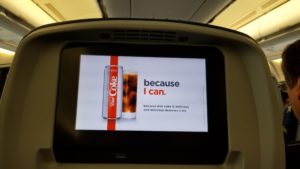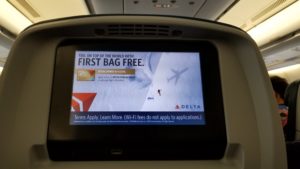Recently, I was travelling on Delta and was slightly disappointed that I couldn’t start my movies as soon as I had sat down. Instead, there were two flyers for the Delta credit card and for Diet Coke repeating on the screen ahead of me. This is an interesting strategy because it capitalizes on the fact that the consumers have to look at it because it is literally thirty inches in front of their face and because they can’t turn it off until liftoff. While this may disappoint a couple flyers like me, who were looking forward to starting their binge watching, it won’t be enough of an inconvenience that it ruins our trip to the point of complaining or considering a loyalty switch.
 What makes this advertisement great is that both call to actions are immediately actionable. In this situation, Coca Cola is using mass marketing to encourage flyers to try the coke, which is very relevant in the ad explanation: “because diet coke is delicious and deserves a try.” By advertising it on a plane, where drinks are free, Coca-Cola has leveraged the reduced cost barriers for the consumer. If consumers see this ad somewhere else, they might be intrigued but unwilling to spend money on something that they don’t know whether they are going to like or not. Yet, on a plane, they can order it when the stewardess walks by and if they don’t like it, they can throw it away. But if they do like it, the consumer would be more willing to buy it the next time that they are at a grocery store. Additionally, the consumer might be more emotionally attached to Coke as a result of this experience because they can say that they first tried it on a plane after a very pleasant vacation or trip.
What makes this advertisement great is that both call to actions are immediately actionable. In this situation, Coca Cola is using mass marketing to encourage flyers to try the coke, which is very relevant in the ad explanation: “because diet coke is delicious and deserves a try.” By advertising it on a plane, where drinks are free, Coca-Cola has leveraged the reduced cost barriers for the consumer. If consumers see this ad somewhere else, they might be intrigued but unwilling to spend money on something that they don’t know whether they are going to like or not. Yet, on a plane, they can order it when the stewardess walks by and if they don’t like it, they can throw it away. But if they do like it, the consumer would be more willing to buy it the next time that they are at a grocery store. Additionally, the consumer might be more emotionally attached to Coke as a result of this experience because they can say that they first tried it on a plane after a very pleasant vacation or trip.
 Similarly, the Delta credit card advertisement is immediately actionable and encourages consumers to sign up with a limited offer and by decreasing barriers. Delta tries to entice consumers by suggesting that with a Delta credit card, consumers would feel like they are “on top of the world”, that they are very accomplished and having a great time. If this value proposition appeals to the consumers, they can easily go online and apply to the card. First, even if the customer doesn’t have free wifi, they can used the onboard wifi free of charge for the credit card application. Secondly, if they would normally say, that sounds great but I don’t have enough time, that reason not to do it is immediately removed as they will be stuck on an airplane with nowhere to go for the next couple of hours so they might as well apply. Moreover, the offer expiration creates a sense of urgency in the consumer in order to encourage immediate action. Finally, unlike the Coke ad, the Delta credit card ad is in a sense specifically targeting people who are Delta customers. An airline credit card is not a product that can be mass marketed and having it displayed to passengers is a great way to target the ad.
Similarly, the Delta credit card advertisement is immediately actionable and encourages consumers to sign up with a limited offer and by decreasing barriers. Delta tries to entice consumers by suggesting that with a Delta credit card, consumers would feel like they are “on top of the world”, that they are very accomplished and having a great time. If this value proposition appeals to the consumers, they can easily go online and apply to the card. First, even if the customer doesn’t have free wifi, they can used the onboard wifi free of charge for the credit card application. Secondly, if they would normally say, that sounds great but I don’t have enough time, that reason not to do it is immediately removed as they will be stuck on an airplane with nowhere to go for the next couple of hours so they might as well apply. Moreover, the offer expiration creates a sense of urgency in the consumer in order to encourage immediate action. Finally, unlike the Coke ad, the Delta credit card ad is in a sense specifically targeting people who are Delta customers. An airline credit card is not a product that can be mass marketed and having it displayed to passengers is a great way to target the ad.
While I would prefer to have access to my movies right away, I find this marketing campaign very clever as the ads are immediately relevant to the consumers. Are there any other situations that you can think of where the advertiser leverages the fact that consumers can walk away from the ad or turn it off? How effective do you think that is?